Report on Global Business: Drivers, Benefits, Barriers & WTO Role
VerifiedAdded on 2023/06/15
|8
|1426
|326
Report
AI Summary
This report provides a comprehensive overview of global business aspects, focusing on the drivers behind globalisation, such as technological advancements, political factors, and market demands. It highlights the benefits of internationalisation, including access to new markets and diverse products for consumers, while also addressing the barriers and challenges that companies face, such as ethical and cultural considerations, and compliance risks. The report differentiates between domestic and international business models and examines the crucial role of the World Trade Organisation (WTO) in facilitating international trade through agreements, dispute resolution, and policy implementation. Furthermore, it analyses the effects of trade barriers, including tariff and non-tariff barriers, on international business operations, impacting costs and market access.
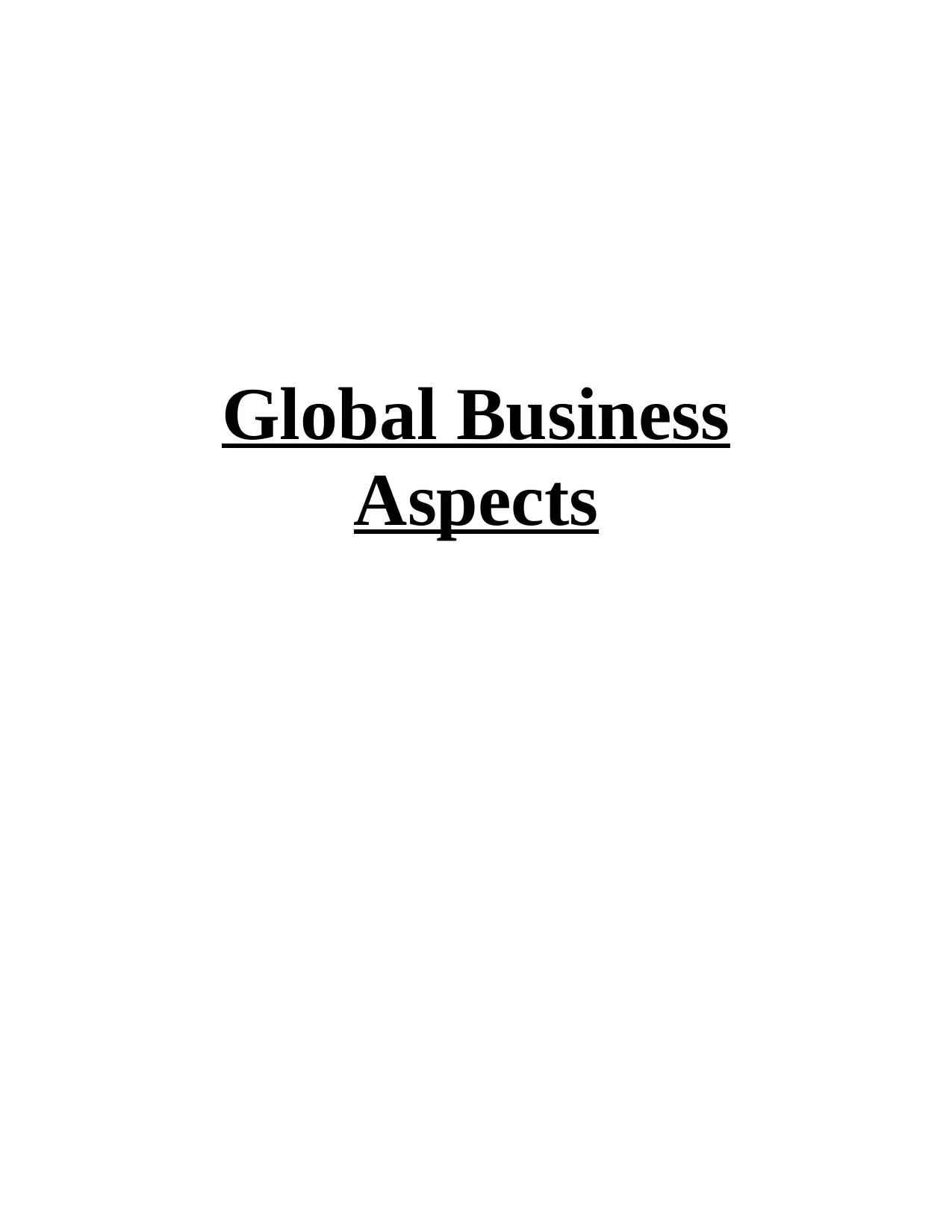
Global Business
Aspects
Aspects
Paraphrase This Document
Need a fresh take? Get an instant paraphrase of this document with our AI Paraphraser
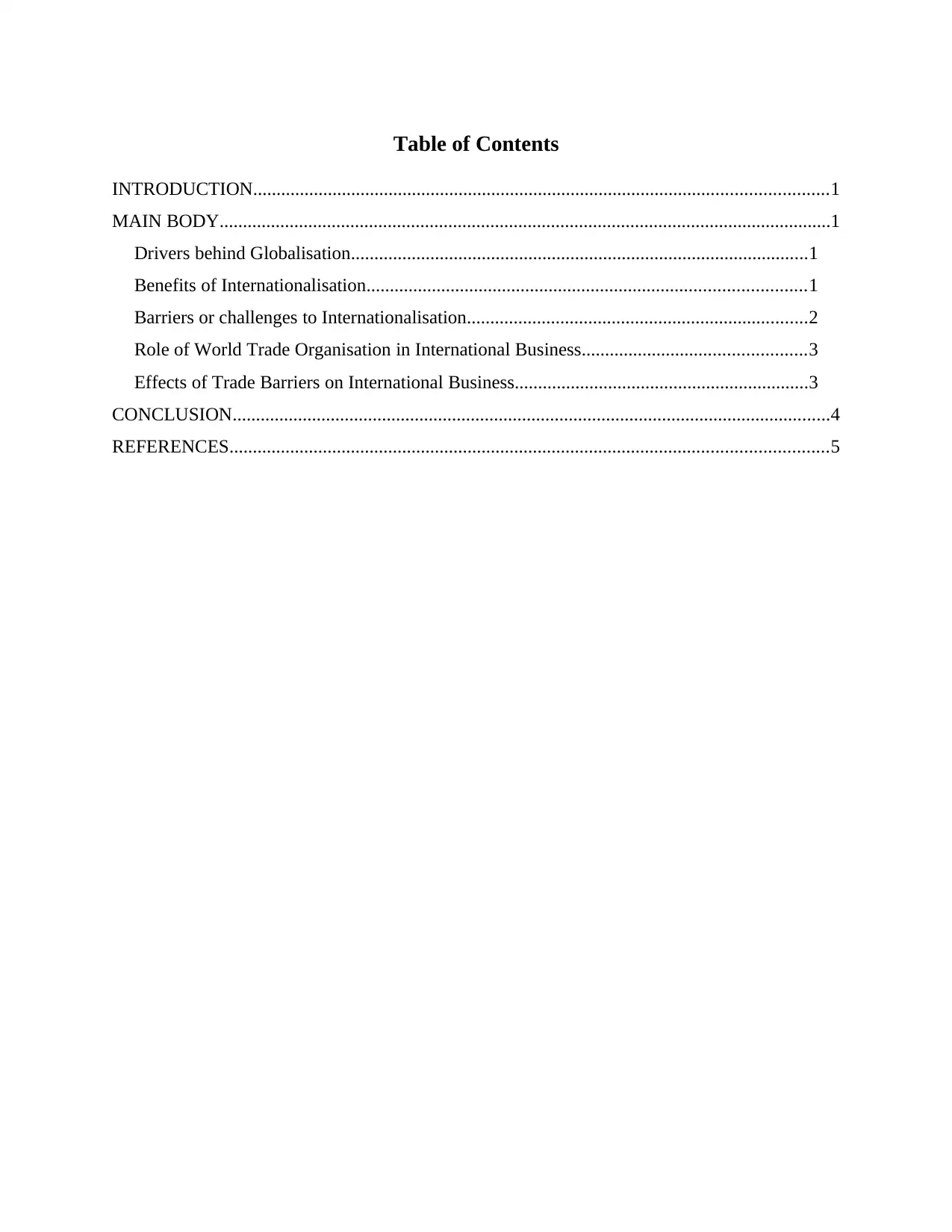
Table of Contents
INTRODUCTION...........................................................................................................................1
MAIN BODY...................................................................................................................................1
Drivers behind Globalisation..................................................................................................1
Benefits of Internationalisation..............................................................................................1
Barriers or challenges to Internationalisation.........................................................................2
Role of World Trade Organisation in International Business................................................3
Effects of Trade Barriers on International Business...............................................................3
CONCLUSION................................................................................................................................4
REFERENCES................................................................................................................................5
INTRODUCTION...........................................................................................................................1
MAIN BODY...................................................................................................................................1
Drivers behind Globalisation..................................................................................................1
Benefits of Internationalisation..............................................................................................1
Barriers or challenges to Internationalisation.........................................................................2
Role of World Trade Organisation in International Business................................................3
Effects of Trade Barriers on International Business...............................................................3
CONCLUSION................................................................................................................................4
REFERENCES................................................................................................................................5
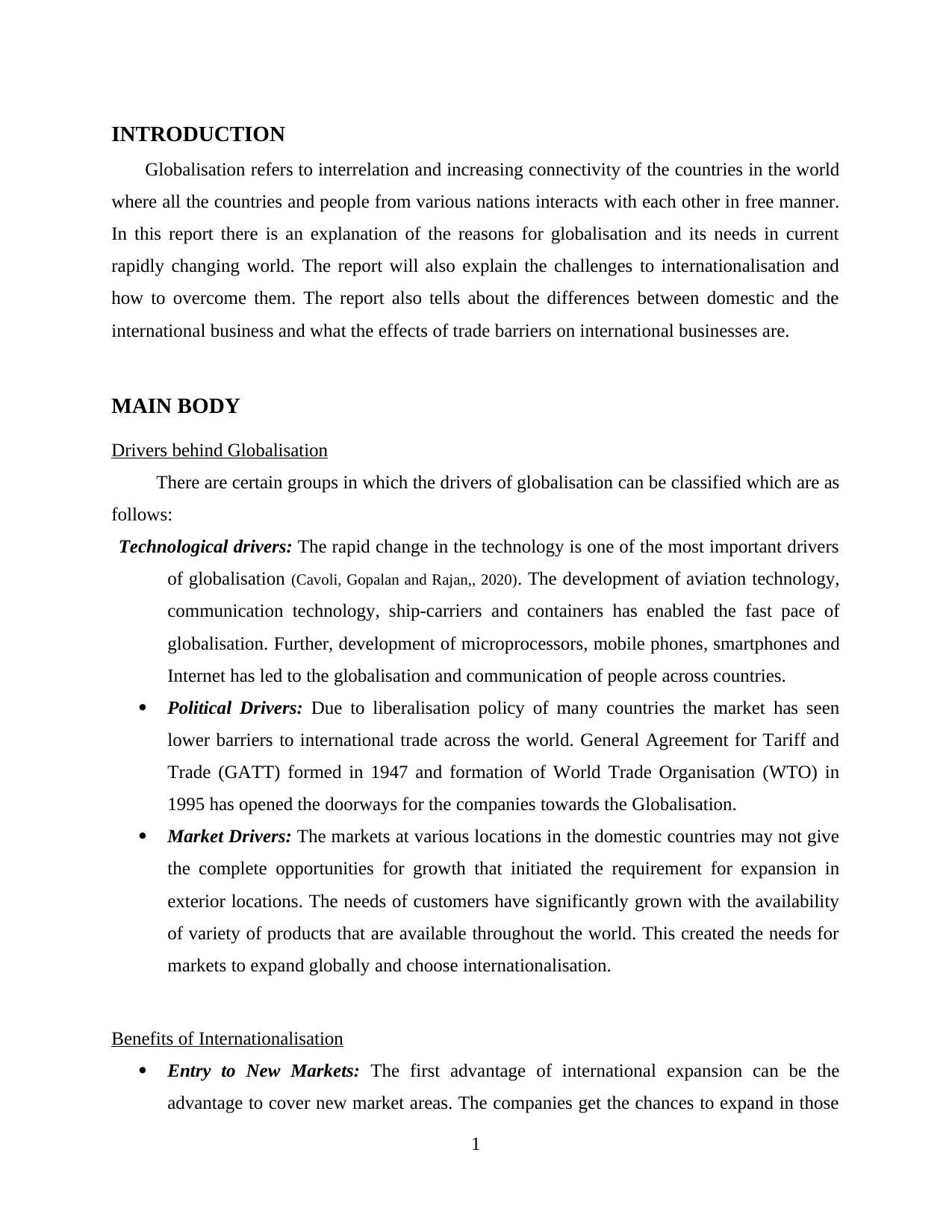
INTRODUCTION
Globalisation refers to interrelation and increasing connectivity of the countries in the world
where all the countries and people from various nations interacts with each other in free manner.
In this report there is an explanation of the reasons for globalisation and its needs in current
rapidly changing world. The report will also explain the challenges to internationalisation and
how to overcome them. The report also tells about the differences between domestic and the
international business and what the effects of trade barriers on international businesses are.
MAIN BODY
Drivers behind Globalisation
There are certain groups in which the drivers of globalisation can be classified which are as
follows:
Technological drivers: The rapid change in the technology is one of the most important drivers
of globalisation (Cavoli, Gopalan and Rajan,, 2020). The development of aviation technology,
communication technology, ship-carriers and containers has enabled the fast pace of
globalisation. Further, development of microprocessors, mobile phones, smartphones and
Internet has led to the globalisation and communication of people across countries.
Political Drivers: Due to liberalisation policy of many countries the market has seen
lower barriers to international trade across the world. General Agreement for Tariff and
Trade (GATT) formed in 1947 and formation of World Trade Organisation (WTO) in
1995 has opened the doorways for the companies towards the Globalisation.
Market Drivers: The markets at various locations in the domestic countries may not give
the complete opportunities for growth that initiated the requirement for expansion in
exterior locations. The needs of customers have significantly grown with the availability
of variety of products that are available throughout the world. This created the needs for
markets to expand globally and choose internationalisation.
Benefits of Internationalisation
Entry to New Markets: The first advantage of international expansion can be the
advantage to cover new market areas. The companies get the chances to expand in those
1
Globalisation refers to interrelation and increasing connectivity of the countries in the world
where all the countries and people from various nations interacts with each other in free manner.
In this report there is an explanation of the reasons for globalisation and its needs in current
rapidly changing world. The report will also explain the challenges to internationalisation and
how to overcome them. The report also tells about the differences between domestic and the
international business and what the effects of trade barriers on international businesses are.
MAIN BODY
Drivers behind Globalisation
There are certain groups in which the drivers of globalisation can be classified which are as
follows:
Technological drivers: The rapid change in the technology is one of the most important drivers
of globalisation (Cavoli, Gopalan and Rajan,, 2020). The development of aviation technology,
communication technology, ship-carriers and containers has enabled the fast pace of
globalisation. Further, development of microprocessors, mobile phones, smartphones and
Internet has led to the globalisation and communication of people across countries.
Political Drivers: Due to liberalisation policy of many countries the market has seen
lower barriers to international trade across the world. General Agreement for Tariff and
Trade (GATT) formed in 1947 and formation of World Trade Organisation (WTO) in
1995 has opened the doorways for the companies towards the Globalisation.
Market Drivers: The markets at various locations in the domestic countries may not give
the complete opportunities for growth that initiated the requirement for expansion in
exterior locations. The needs of customers have significantly grown with the availability
of variety of products that are available throughout the world. This created the needs for
markets to expand globally and choose internationalisation.
Benefits of Internationalisation
Entry to New Markets: The first advantage of international expansion can be the
advantage to cover new market areas. The companies get the chances to expand in those
1
⊘ This is a preview!⊘
Do you want full access?
Subscribe today to unlock all pages.

Trusted by 1+ million students worldwide
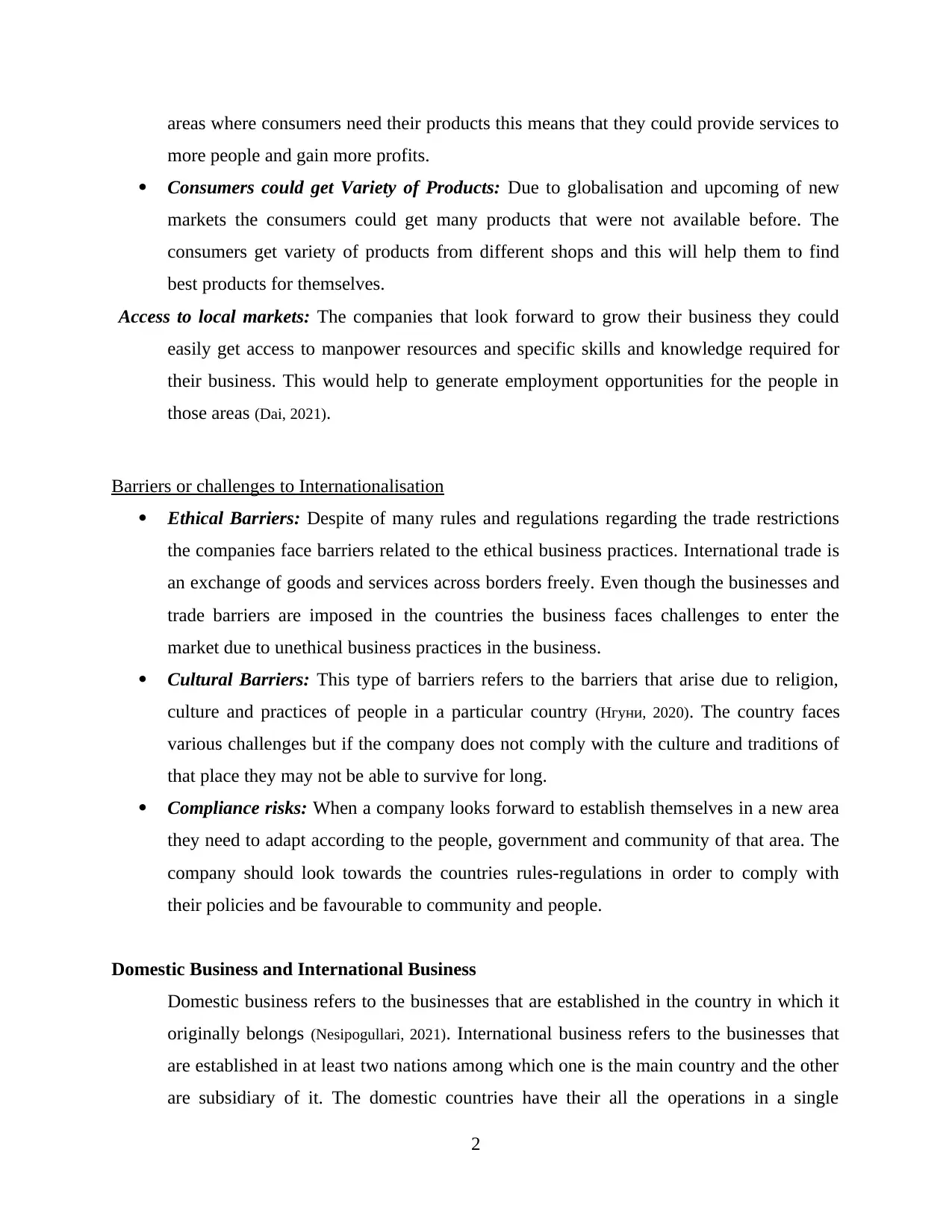
areas where consumers need their products this means that they could provide services to
more people and gain more profits.
Consumers could get Variety of Products: Due to globalisation and upcoming of new
markets the consumers could get many products that were not available before. The
consumers get variety of products from different shops and this will help them to find
best products for themselves.
Access to local markets: The companies that look forward to grow their business they could
easily get access to manpower resources and specific skills and knowledge required for
their business. This would help to generate employment opportunities for the people in
those areas (Dai, 2021).
Barriers or challenges to Internationalisation
Ethical Barriers: Despite of many rules and regulations regarding the trade restrictions
the companies face barriers related to the ethical business practices. International trade is
an exchange of goods and services across borders freely. Even though the businesses and
trade barriers are imposed in the countries the business faces challenges to enter the
market due to unethical business practices in the business.
Cultural Barriers: This type of barriers refers to the barriers that arise due to religion,
culture and practices of people in a particular country (Нгуни, 2020). The country faces
various challenges but if the company does not comply with the culture and traditions of
that place they may not be able to survive for long.
Compliance risks: When a company looks forward to establish themselves in a new area
they need to adapt according to the people, government and community of that area. The
company should look towards the countries rules-regulations in order to comply with
their policies and be favourable to community and people.
Domestic Business and International Business
Domestic business refers to the businesses that are established in the country in which it
originally belongs (Nesipogullari, 2021). International business refers to the businesses that
are established in at least two nations among which one is the main country and the other
are subsidiary of it. The domestic countries have their all the operations in a single
2
more people and gain more profits.
Consumers could get Variety of Products: Due to globalisation and upcoming of new
markets the consumers could get many products that were not available before. The
consumers get variety of products from different shops and this will help them to find
best products for themselves.
Access to local markets: The companies that look forward to grow their business they could
easily get access to manpower resources and specific skills and knowledge required for
their business. This would help to generate employment opportunities for the people in
those areas (Dai, 2021).
Barriers or challenges to Internationalisation
Ethical Barriers: Despite of many rules and regulations regarding the trade restrictions
the companies face barriers related to the ethical business practices. International trade is
an exchange of goods and services across borders freely. Even though the businesses and
trade barriers are imposed in the countries the business faces challenges to enter the
market due to unethical business practices in the business.
Cultural Barriers: This type of barriers refers to the barriers that arise due to religion,
culture and practices of people in a particular country (Нгуни, 2020). The country faces
various challenges but if the company does not comply with the culture and traditions of
that place they may not be able to survive for long.
Compliance risks: When a company looks forward to establish themselves in a new area
they need to adapt according to the people, government and community of that area. The
company should look towards the countries rules-regulations in order to comply with
their policies and be favourable to community and people.
Domestic Business and International Business
Domestic business refers to the businesses that are established in the country in which it
originally belongs (Nesipogullari, 2021). International business refers to the businesses that
are established in at least two nations among which one is the main country and the other
are subsidiary of it. The domestic countries have their all the operations in a single
2
Paraphrase This Document
Need a fresh take? Get an instant paraphrase of this document with our AI Paraphraser

country and sell their products at various locations but an international business carries its
activities in many countries.
Role of World Trade Organisation in International Business
WTO or World Trade Organisation is the only international association that operates
globally and takes care of the rule and regulations regarding the international trade
between the countries. The main function of WTO is to make the agreements,
restrictions, rules, negotiations and policies regarding the international trade by the
countries and ratify it in their parliaments. The main motive is to ensure the smooth flow
of trading activities that is liberal, predictable and compliances with the rules and
regulations of international trade laws (LUCA, 2021)
. In brief the functions of WTO are as follows:
Facilitate smooth operations of trade between the countries by regular administration,
trade, smooth operations of trade between the countries.
Provide and improvise trade negotiations between the member countries.
Solving the trade dispute and constraints among the countries by implementing smooth
laws and regulations.
Cooperation with the International Monetary Fund or World Bank (IMF) to form global
economic policies regarding smooth flow of trading activities.
Effects of Trade Barriers on International Business
There are various barriers related to the international trade that almost every company
faces while moving in a foreign location (Lueders, 2020)
. These barriers are as follows:
Tariff Barriers: It refers to the barriers that are imposed on the import and export of
goods and services by the nations to protect themselves against irregularities. Tariff
barriers tends to rise the costs of products and services of the products that are imported
and makes it difficult for the companies to sell their products in the market.
Non-tariff/Quota Barriers: Government uses various tools to restrict the limits of the
trading on certain commodities or services. This helps to reduce the imports or limit the
3
activities in many countries.
Role of World Trade Organisation in International Business
WTO or World Trade Organisation is the only international association that operates
globally and takes care of the rule and regulations regarding the international trade
between the countries. The main function of WTO is to make the agreements,
restrictions, rules, negotiations and policies regarding the international trade by the
countries and ratify it in their parliaments. The main motive is to ensure the smooth flow
of trading activities that is liberal, predictable and compliances with the rules and
regulations of international trade laws (LUCA, 2021)
. In brief the functions of WTO are as follows:
Facilitate smooth operations of trade between the countries by regular administration,
trade, smooth operations of trade between the countries.
Provide and improvise trade negotiations between the member countries.
Solving the trade dispute and constraints among the countries by implementing smooth
laws and regulations.
Cooperation with the International Monetary Fund or World Bank (IMF) to form global
economic policies regarding smooth flow of trading activities.
Effects of Trade Barriers on International Business
There are various barriers related to the international trade that almost every company
faces while moving in a foreign location (Lueders, 2020)
. These barriers are as follows:
Tariff Barriers: It refers to the barriers that are imposed on the import and export of
goods and services by the nations to protect themselves against irregularities. Tariff
barriers tends to rise the costs of products and services of the products that are imported
and makes it difficult for the companies to sell their products in the market.
Non-tariff/Quota Barriers: Government uses various tools to restrict the limits of the
trading on certain commodities or services. This helps to reduce the imports or limit the
3
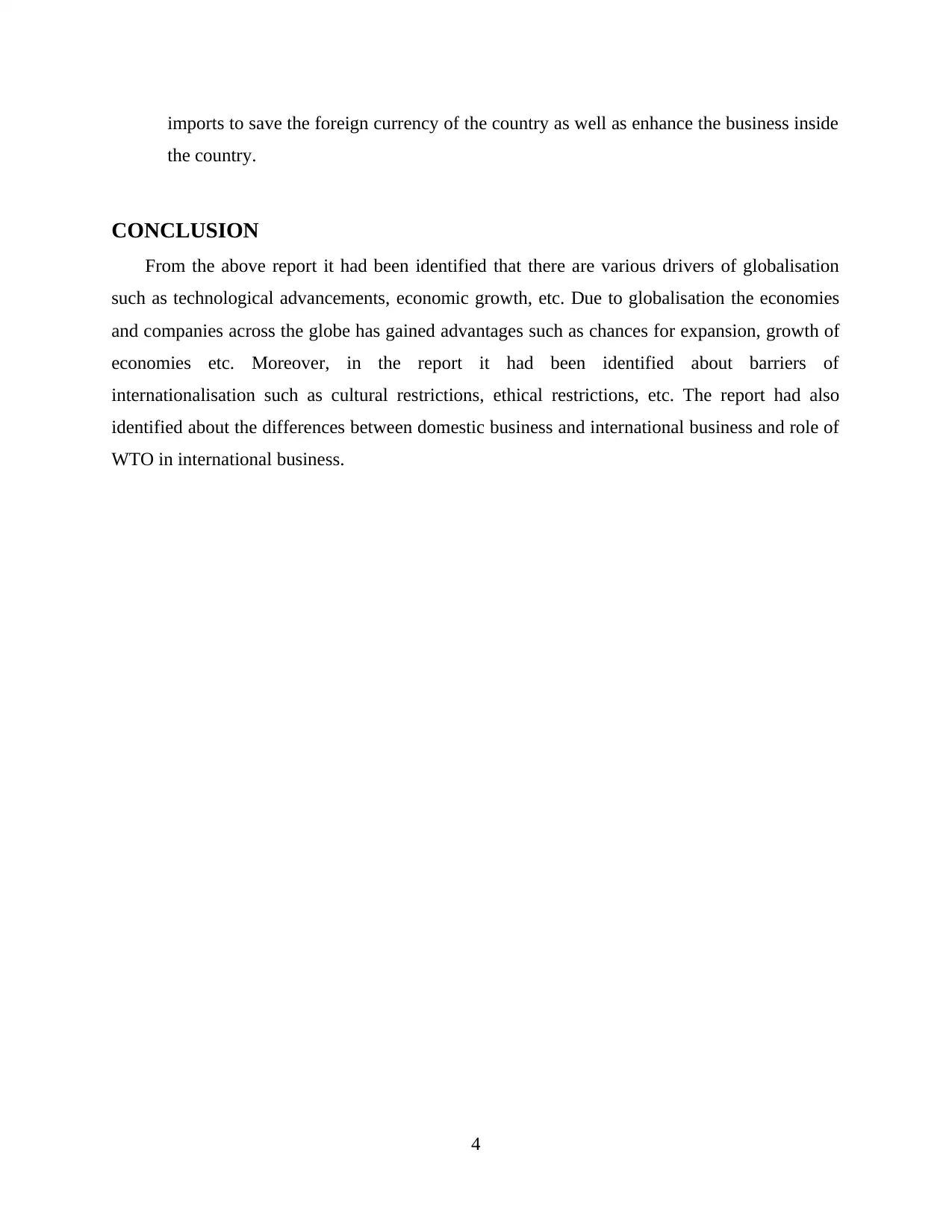
imports to save the foreign currency of the country as well as enhance the business inside
the country.
CONCLUSION
From the above report it had been identified that there are various drivers of globalisation
such as technological advancements, economic growth, etc. Due to globalisation the economies
and companies across the globe has gained advantages such as chances for expansion, growth of
economies etc. Moreover, in the report it had been identified about barriers of
internationalisation such as cultural restrictions, ethical restrictions, etc. The report had also
identified about the differences between domestic business and international business and role of
WTO in international business.
4
the country.
CONCLUSION
From the above report it had been identified that there are various drivers of globalisation
such as technological advancements, economic growth, etc. Due to globalisation the economies
and companies across the globe has gained advantages such as chances for expansion, growth of
economies etc. Moreover, in the report it had been identified about barriers of
internationalisation such as cultural restrictions, ethical restrictions, etc. The report had also
identified about the differences between domestic business and international business and role of
WTO in international business.
4
⊘ This is a preview!⊘
Do you want full access?
Subscribe today to unlock all pages.

Trusted by 1+ million students worldwide
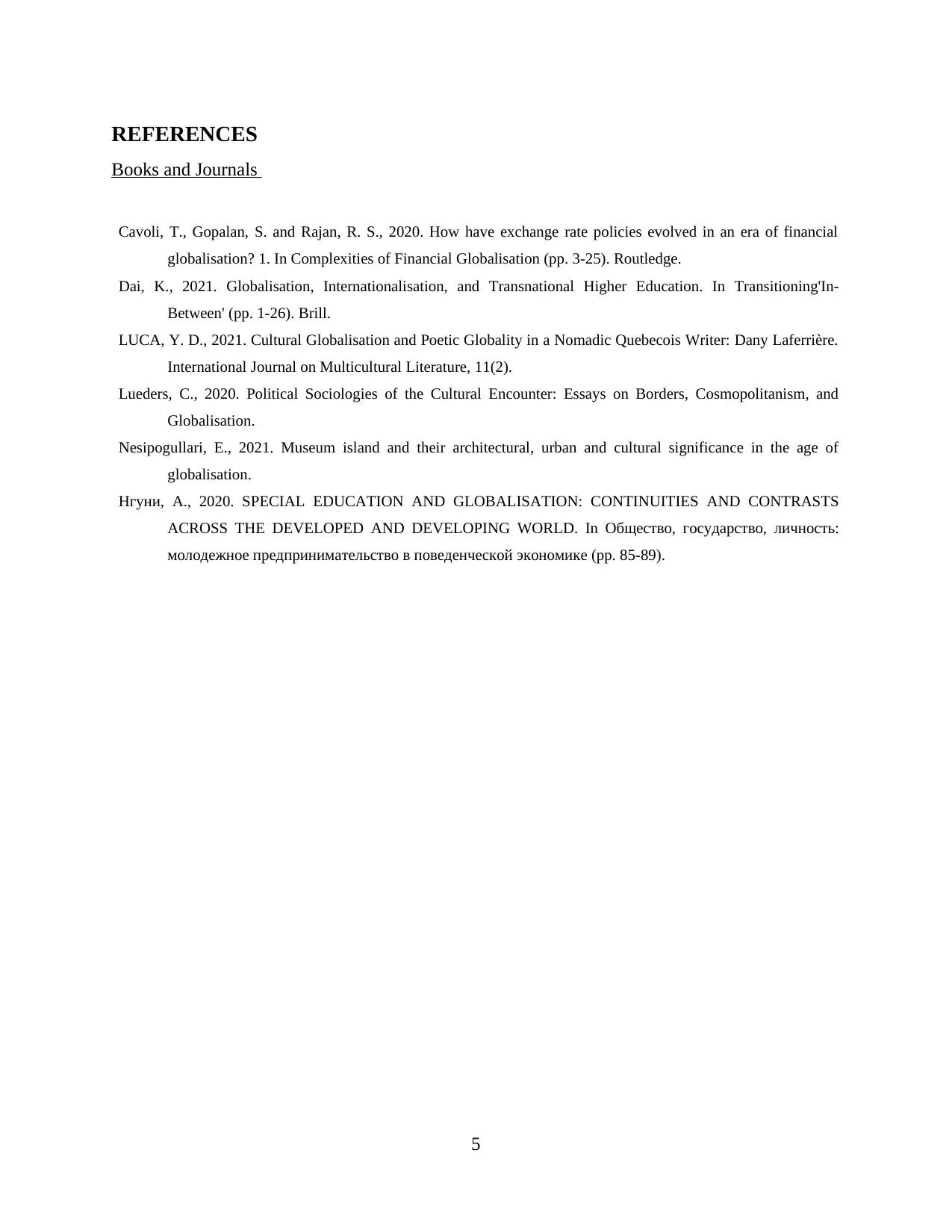
REFERENCES
Books and Journals
Cavoli, T., Gopalan, S. and Rajan, R. S., 2020. How have exchange rate policies evolved in an era of financial
globalisation? 1. In Complexities of Financial Globalisation (pp. 3-25). Routledge.
Dai, K., 2021. Globalisation, Internationalisation, and Transnational Higher Education. In Transitioning'In-
Between' (pp. 1-26). Brill.
LUCA, Y. D., 2021. Cultural Globalisation and Poetic Globality in a Nomadic Quebecois Writer: Dany Laferrière.
International Journal on Multicultural Literature, 11(2).
Lueders, C., 2020. Political Sociologies of the Cultural Encounter: Essays on Borders, Cosmopolitanism, and
Globalisation.
Nesipogullari, E., 2021. Museum island and their architectural, urban and cultural significance in the age of
globalisation.
Нгуни, А., 2020. SPECIAL EDUCATION AND GLOBALISATION: CONTINUITIES AND CONTRASTS
ACROSS THE DEVELOPED AND DEVELOPING WORLD. In Общество, государство, личность:
молодежное предпринимательство в поведенческой экономике (pp. 85-89).
5
Books and Journals
Cavoli, T., Gopalan, S. and Rajan, R. S., 2020. How have exchange rate policies evolved in an era of financial
globalisation? 1. In Complexities of Financial Globalisation (pp. 3-25). Routledge.
Dai, K., 2021. Globalisation, Internationalisation, and Transnational Higher Education. In Transitioning'In-
Between' (pp. 1-26). Brill.
LUCA, Y. D., 2021. Cultural Globalisation and Poetic Globality in a Nomadic Quebecois Writer: Dany Laferrière.
International Journal on Multicultural Literature, 11(2).
Lueders, C., 2020. Political Sociologies of the Cultural Encounter: Essays on Borders, Cosmopolitanism, and
Globalisation.
Nesipogullari, E., 2021. Museum island and their architectural, urban and cultural significance in the age of
globalisation.
Нгуни, А., 2020. SPECIAL EDUCATION AND GLOBALISATION: CONTINUITIES AND CONTRASTS
ACROSS THE DEVELOPED AND DEVELOPING WORLD. In Общество, государство, личность:
молодежное предпринимательство в поведенческой экономике (pp. 85-89).
5
Paraphrase This Document
Need a fresh take? Get an instant paraphrase of this document with our AI Paraphraser

6
1 out of 8
Related Documents
Your All-in-One AI-Powered Toolkit for Academic Success.
+13062052269
info@desklib.com
Available 24*7 on WhatsApp / Email
![[object Object]](/_next/static/media/star-bottom.7253800d.svg)
Unlock your academic potential
Copyright © 2020–2026 A2Z Services. All Rights Reserved. Developed and managed by ZUCOL.




